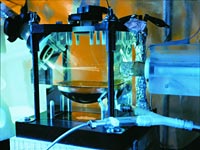Bioinformatics/Biomed Eng - 3757
Program Summary
Faculty: Faculty of Engineering
Contact: http://www.cse.unsw.edu.au
Campus: Kensington Campus
Career: Undergraduate
Typical Duration: 5 Years
Typical UOC Per Semester: 24
Min UOC Per Semester: 3
Max UOC Per Semester: 27
Min UOC For Award: 240
UAC Code: 425012
International Entry Requirements: See International Entry Requirements
Award(s):
Bachelor of Engineering (Major)
Master of Biomedical Engineering (Specialisation)
Information valid for students commencing 2013.
Students who commenced prior to 2013 should go to the Handbook's Previous Editions
Program Description
At the end of the program successful candidates will graduate with a Bachelor in Engineering and a Masters in Biomedical Engineering. Students are expected to perform at a credit average (65%) or better in their first three years to be permitted to continue with the Masters part of the program. Students who do not satisfy this requirement can revert to the Bachelor of Engineering program.
Program Objectives and Graduate Attributes
Program Structure
- BABS1201 Molecules, Cells and Genes (6 UOC)
- BINF1001 Bioinformatics 1 (6 UOC)
- COMP1917 Computing 1 (6 UOC)
- COMP1927 Computing 2 (6 UOC)
- MATH1131 Mathematics 1A (6 UOC)
- MATH1141 Higher Mathematics 1A (6 UOC)
- MATH1231 Mathematics 1B (6 UOC)
- MATH1241 Higher Mathematics 1B (6 UOC)
- CHEM1011 Chemistry A (6 UOC)
- CHEM1031 Higher Chemistry A (6 UOC)
- CHEM1021 Chemistry B (6 UOC)
- CHEM1041 Higher Chemistry B (6 UOC)
- BIOC2201 Principles of Mol. Biol (Adv) (6 UOC)
- BIOM1010 Engineering in Medicine (6 UOC)
- COMP2041 Software Construction (6 UOC)
- COMP2911 Eng. Design in Computing (6 UOC)
- ENGG1000 Engineering Design (6 UOC)
- MATH1081 Discrete Mathematics (6 UOC)
- BABS2202 Molecular Cell Biology 1 (6 UOC)
- BIOC2101 Principles of Biochem (Adv) (6 UOC)
- BIOS2021 Genetics (6 UOC)
- BIOS2621 Genetics (Advanced Level) (6 UOC)
- MICR2011 Microbiology 1 (6 UOC)
- BABS2202 Molecular Cell Biology 1 (6 UOC)
- BIOC2101 Principles of Biochem (Adv) (6 UOC)
- BIOS2021 Genetics (6 UOC)
- BIOS2621 Genetics (Advanced Level) (6 UOC)
- MICR2011 Microbiology 1 (6 UOC)
- BIOM5950 Thesis Part A (COMP) (6 UOC)
- PHSL2121 Principles of Physiology A (6 UOC)
- BIOM9xxx Postgraduate Elective (12UoC)
- BIOM9xxx Postgraduate Elective (6UoC) OR PHSL2221 - Principles of Physiology B (6UOC)
- General Education (6UoC)
- Life Sciences Elective (6UoC)
- Computing/Maths Elective (6UoC)
- BIOM9xxx Postgraduate Elective (6UoC)
- BIOM9914 Masters Thesis OR BIOM9xxx Postgraduate Electives (12UoC)
- Life Sciences Elective (6UoC)
- Computing/Maths Elective (6UoC)
- COMP/MATH/Life Sciences Elective (6UoC)
- MATH2281 Biomathematics (6 UOC)
- MATH2831 Linear Models (6 UOC)
- MATH2931 Higher Linear Models (6 UOC)
- MATH3801 Probability & Stochastic Proc (6 UOC)
- MATH3811 Statistical Inference (6 UOC)
- MATH3901 Higher Prob & Stochastic Proc (6 UOC)
- MATH3911 Higher Statistical Inference (6 UOC)
GSBmE Web Pages for current course outlines.
General Education Requirements
It may not be possible for computing students to enrol in general education courses which are similar in content to the courses offered in the respective degrees so please check with the School of Computer Science.
Honours
Academic Rules
Fees
Honours
Honours Class 1: WA greater than or equal to 75
Honours Class 2: Division 1: WA equal to 70 up to and including 74
Division 2: WA equal to 65 up to and including 69
Industrial Training Requirement
Professional Recognition
Accreditation will be sought from the Australian Computing Society.
Professional Recognition
The professional body for engineering in Australia is Engineers Australia, which has as its first objective the promotion of the science and practice of engineering in all its branches.
Engineers Australia has its national headquarters in Canberra and functions through a series of divisions, the local one being the Sydney Division. Within each division are branches representing the main interests within the profession, e.g. civil, mechanical, electrical, engineering management and environmental engineering.
Students of an approved school of engineering may join the Institution as a student member (StudIEAust). Student members receive the monthly publication Engineers Australia and for a small fee they also receive The Transactions which contains articles on a particular branch of engineering.
Student members are invited to participate in the Excellence Award for Work Experience, the National Young Engineer of the Year Award and to avail themselves of other Engineers Australia services including the Mentor Scheme and industrial experience guidance.
For more information and membership application forms, contact Engineers Australia, Sydney Division, Level 3, 8 Thomas Street, CHATSWOOD NSW 2067 - telephone 02 9410 5600 www.engineersaustralia.org.au
The Australian Computing Society
The peak professional body for computing in Australia is the Australian Computing Society (ACS) - www.acs.org.au
The objectives of the ACS can be found here and include: "advanc[ing] professional excellence in information and communications technology, and further[ing] the study, science and application of information and communications technology."
Again, students who want to join ACS should go to Member Application
Area(s) of Specialisation









